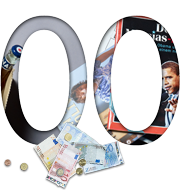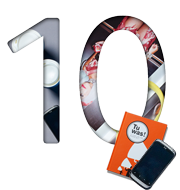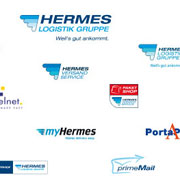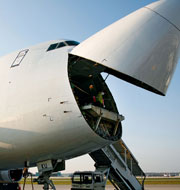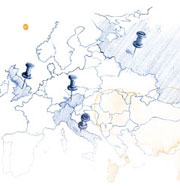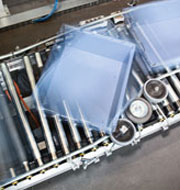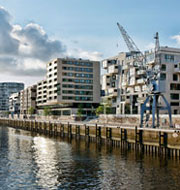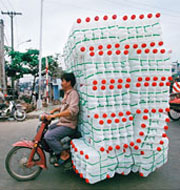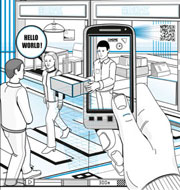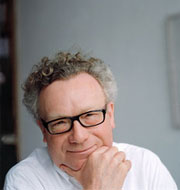

Hanjo Schneider is a Member of the Board of the Otto Group and Chairman of the Board of Hermes Europe GmbH
DEAR STAFF AND PARTNERS,
successful companies usually emerge from a good idea. It was in this way that Hermes was founded in 1972 by the great visionary and entrepreneur Werner Otto, who came up with the idea of offering the customers of the Otto mail order company a better delivery service than could be offered using Deutsche Post. The Hermes Versand Service provided a logistics alternative to the state monopoly. The new parcel service was used in the coming years not just by the various trading companies of the Otto Group but, by the end of the 1990s, also increasingly by companies from outside the Group. Today more than 10,500 people in eleven companies worldwide work under the Hermes umbrella brand and generate a turnover of € 1.8 billion. With the services it offers, it covers the entire value chain of the trade. Whether goods procurement, quality assurance, transport, fulfilment, its traditional parcel service or two-man handling – Hermes offers its customers all of these services on a one-stop-shop basis and is currently the only company to do so worldwide. This makes our company a valued partner of global commerce. In Germany alone, seven of the ten largest mail order retailers entrust the transport of goods to their final customers to Hermes. And in Europe, the company has now become the largest parcel service provider making deliveries to private final customers. From a small and specific parcel service with a commercial background a truly large company has emerged, becoming an integral part of modern street life.
There are many good reasons for this evolution. In the last forty years, Hermes has frequently assumed the role of a trendsetter. This is true, for example, for the establishment of more than 14,000 drop-off points within the German retail sector, which receive and dispatch packages for customers simply and conveniently. The company’s international expansion and development of national companies in Austria, Great Britain, Italy and Russia followed. Today Hermes is a parcel service for all of Europe – for business and private customers alike.
There are many good reasons for this evolution. In the last forty years, Hermes has frequently assumed the role of a trendsetter. This is true, for example, for the establishment of more than 14,000 drop-off points within the German retail sector, which receive and dispatch packages for customers simply and conveniently. The company’s international expansion and development of national companies in Austria, Great Britain, Italy and Russia followed. Today Hermes is a parcel service for all of Europe – for business and private customers alike.
There is, as we know, no recipe for success – it is simply the outcome of hard work. There is a saying in English that might have been written for Hermes: “Let’s try harder!” It is in fact the attitude of going beyond what is standard or thinking that little bit further that makes all of Hermes’ ventures stand out. It was only in this way that it could, as a newcomer, prevail against its established and in some cases state protected competitors, over- come unfair conditions of competition and continually improve its own performance along the value chain of the trade sector.
It is remarkable that Hermes, in the face of these challenges, not only kept pace with developments but in many cases anticipated them, as was the case with the change in consumer behaviour caused by e-commerce. The trade sector has changed again and again in recent years repeatedly setting new tasks for logistics. And by its traditional association with the sector, Hermes feels a sense of attachment to it like virtually no other logistics operator. Consequently, we offer our partners not only first-class transport and distribution services, but we also design powerful online shops and life- style products and test the quality and safety of consumer goods. We are therefore assuming ever more responsibility for processes from our clients so that they are able to invest more time in their core business, be it customer care, marketing or the creation of attractive products and services.
With its increasing size and success, Hermes’ awareness of social and environmental concerns has also grown. We are proud to be able to offer attractive professional prospects to a constantly growing number of people worldwide. We are also stepping up our commitment to the environment, which has been a constant feature of our corporate goals ever since the 1980s. We are nevertheless well aware that much remains to be done in both of these areas, which are vital factors for future economic success.
I have no doubt that we will successfully rise to these challenges at Hermes. You will find out more about this in the corresponding publication commemorating our fiftieth anniversary, if not before. Until then, I hope you enjoy reading about the multifaceted corporate history of Hermes in this chronicle.
Yours,
Hanjo Schneider
Hermes Europe GmbH
It is remarkable that Hermes, in the face of these challenges, not only kept pace with developments but in many cases anticipated them, as was the case with the change in consumer behaviour caused by e-commerce. The trade sector has changed again and again in recent years repeatedly setting new tasks for logistics. And by its traditional association with the sector, Hermes feels a sense of attachment to it like virtually no other logistics operator. Consequently, we offer our partners not only first-class transport and distribution services, but we also design powerful online shops and life- style products and test the quality and safety of consumer goods. We are therefore assuming ever more responsibility for processes from our clients so that they are able to invest more time in their core business, be it customer care, marketing or the creation of attractive products and services.
With its increasing size and success, Hermes’ awareness of social and environmental concerns has also grown. We are proud to be able to offer attractive professional prospects to a constantly growing number of people worldwide. We are also stepping up our commitment to the environment, which has been a constant feature of our corporate goals ever since the 1980s. We are nevertheless well aware that much remains to be done in both of these areas, which are vital factors for future economic success.
I have no doubt that we will successfully rise to these challenges at Hermes. You will find out more about this in the corresponding publication commemorating our fiftieth anniversary, if not before. Until then, I hope you enjoy reading about the multifaceted corporate history of Hermes in this chronicle.
Yours,
Hanjo Schneider
Hermes Europe GmbH

Dr Michael Otto is Chairman of the Supervisory Board and former Chairman of the Management Board of the Otto Group
DEAR READERS,
“We do not consider ourselves to be in competition with Deutsche Bundespost (the German Post Office). On the contrary, we are sharing the workload.” This sentence was said by the entrepreneur Werner Velbinger in an interview shortly before the official launch of the Hermes-Paket-Schnell-Dienst, which forms the core of the present Hermes group of companies. Admittedly, he was being cheeky. Because of course the Hermes-Paket-Schnell-Dienst was precisely that: a private package mailing service.
The idea of setting up the company KG Hermes-Paket-Schnell-Dienst GmbH & Co., as it is officially known, goes back to an intensive discussion within the Otto Versand. And for good reasons: Deutsche Bundespost, which OTTO used at the time to send orders to its customers, was not a commercial service company but rather a state monopoly structured like a public authority. In practice this meant that it was first slow and second expensive. Personally, as somebody who as a youngster had done holiday jobs in the Otto Versand packing department and entered the company in 1971 as an executive responsible for purchasing textiles, I was immediately convinced by the basic idea. Of course, Hermes was not at first big enough to strike fear into the post office. And it was not about that, but rather something much more important: independence. OTTO did not want its customers to have to wait for their goods just because the weather was bad or because a strike had been called. It also did not want to suddenly have to pay 30% more, against all market logic, to send its parcels simply because the government decided it should. We did not any longer want to be at somebody else’s mercy, as one might put it.
So we started delivering ourselves.
The idea of setting up the company KG Hermes-Paket-Schnell-Dienst GmbH & Co., as it is officially known, goes back to an intensive discussion within the Otto Versand. And for good reasons: Deutsche Bundespost, which OTTO used at the time to send orders to its customers, was not a commercial service company but rather a state monopoly structured like a public authority. In practice this meant that it was first slow and second expensive. Personally, as somebody who as a youngster had done holiday jobs in the Otto Versand packing department and entered the company in 1971 as an executive responsible for purchasing textiles, I was immediately convinced by the basic idea. Of course, Hermes was not at first big enough to strike fear into the post office. And it was not about that, but rather something much more important: independence. OTTO did not want its customers to have to wait for their goods just because the weather was bad or because a strike had been called. It also did not want to suddenly have to pay 30% more, against all market logic, to send its parcels simply because the government decided it should. We did not any longer want to be at somebody else’s mercy, as one might put it.
So we started delivering ourselves.
But I would never in my wildest dreams have expected Hermes to become what it is today. 40 years after the beginning of its independence, this group of companies is no longer an in-house delivery service but a cornerstone of the overall Group. And one which, moreover, gives the Otto Group a decisive competitive edge. By this I do not only mean Hermes’ consistently reported record figures in recent years, and a turnover of 1,8 billion euros to the Group’s overall earnings. Above all I mean that the Otto Group is the only home- shopping retailer worldwide to have its own logistics and service wing. One whose services have earned such respect that direct competitors become clients and customers. And, I also believe that Hermes has accomplished the paradox of remaining true to itself over four decades while at the same time constantly reinventing itself.
How does it achieve this? There is a model in the form of a circle which is said to originate from a Tibetan monk. This circle is divided into four parts. One part is talent: Hermes found this in qualified partners such as the above-mentioned Werner Velbinger, then later through its own growing experience and then by passing this experience on to its young trainees. The second part is hard work: Hermes has never been afraid of knuckling down. This was confirmed by one of my neighbours, who shortly before Christmas came into conversation with a Hermes delivery agent and was surprised to discover that she was only helping out and normally worked in tender management. The third part is intelligence: this goes without saying in such a highly complex discipline as logistics, but it also refers to the ability to recognise opportunities and a desire to experiment. I still smile today when I think of how, in the 1970s, Hermes delivery vehicles were converted into camper vans before the holiday period. Even though the idea was not successful, it was a good idea and one which was worth trying out.
However, this basically requires a constant readiness and ability to be open to new circumstances, challenges and even criticism. The company has impressively proved itself with regard to the latter in the recent past. One needs courage to take corporate responsibility beyond one’s own company, for example for the employees of service providers and cooperation partners. But it is indeed such moral standards and wisdom that are needed in order to keep the company sustainable for the future. The model goes further, because if the first three are in place, the fourth factor for success is luck. It is not for nothing that it is said that luck must be earned.
Hermes has also had luck. I remember well all those signs as early as in the 1970s, which from then on became ever clearer, that predicted the downfall of the mail-order trade. The Otto Group, and with it Hermes, was always convinced that the opposite was true. This view was confirmed by the invention of the internet and e-commerce, if not before then. I therefore wish Hermes just one thing: continued good luck for the next 40 years.
Yours,
Dr. Michael Otto
Chairman of the Supervisory Board of the Otto Group
How does it achieve this? There is a model in the form of a circle which is said to originate from a Tibetan monk. This circle is divided into four parts. One part is talent: Hermes found this in qualified partners such as the above-mentioned Werner Velbinger, then later through its own growing experience and then by passing this experience on to its young trainees. The second part is hard work: Hermes has never been afraid of knuckling down. This was confirmed by one of my neighbours, who shortly before Christmas came into conversation with a Hermes delivery agent and was surprised to discover that she was only helping out and normally worked in tender management. The third part is intelligence: this goes without saying in such a highly complex discipline as logistics, but it also refers to the ability to recognise opportunities and a desire to experiment. I still smile today when I think of how, in the 1970s, Hermes delivery vehicles were converted into camper vans before the holiday period. Even though the idea was not successful, it was a good idea and one which was worth trying out.
However, this basically requires a constant readiness and ability to be open to new circumstances, challenges and even criticism. The company has impressively proved itself with regard to the latter in the recent past. One needs courage to take corporate responsibility beyond one’s own company, for example for the employees of service providers and cooperation partners. But it is indeed such moral standards and wisdom that are needed in order to keep the company sustainable for the future. The model goes further, because if the first three are in place, the fourth factor for success is luck. It is not for nothing that it is said that luck must be earned.
Hermes has also had luck. I remember well all those signs as early as in the 1970s, which from then on became ever clearer, that predicted the downfall of the mail-order trade. The Otto Group, and with it Hermes, was always convinced that the opposite was true. This view was confirmed by the invention of the internet and e-commerce, if not before then. I therefore wish Hermes just one thing: continued good luck for the next 40 years.
Yours,
Dr. Michael Otto
Chairman of the Supervisory Board of the Otto Group





